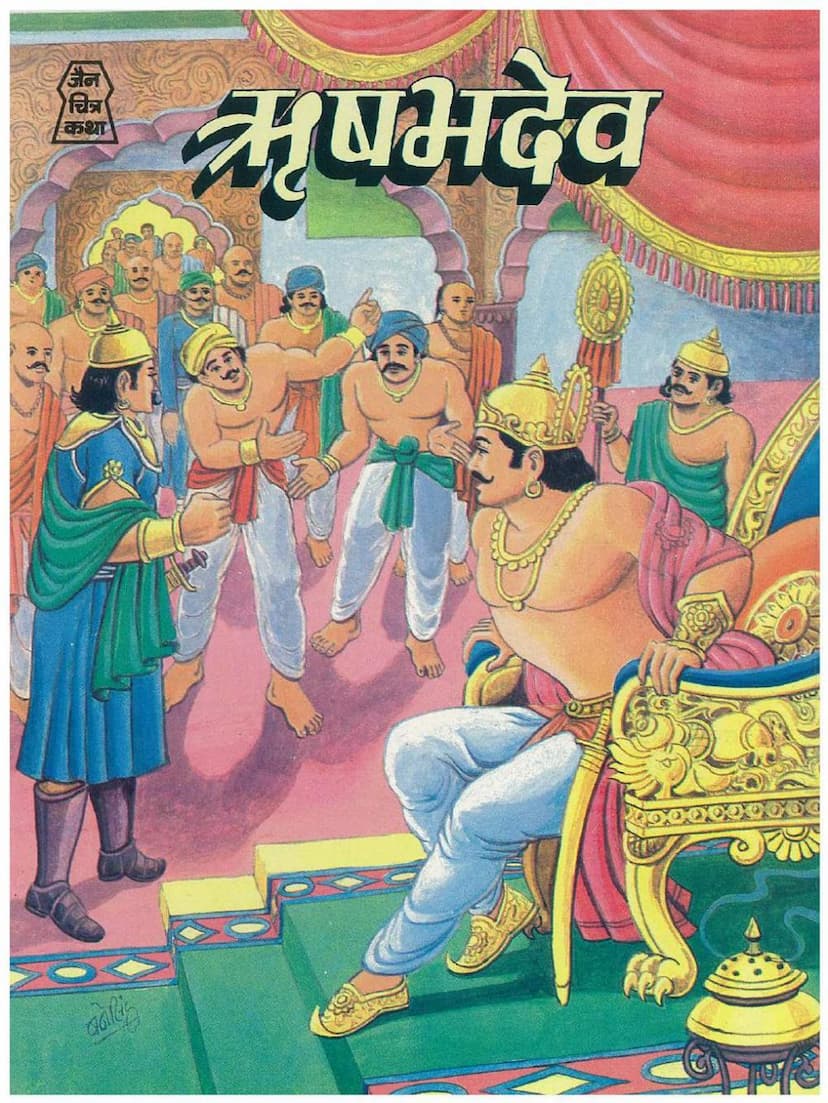Rushabhdev
Added to library: September 2, 2025

Summary
Here is a comprehensive summary in English of the Jain text "Rushabhdev" by Mishrilal Jain, based on the provided pages:
This Jain illustrated storybook, "Rushabhdev," published by Acharya Dharmshrut Granthmala, chronicles the life of Lord Rishabhdev, the first Tirthankar of Jainism.
The Beginning of Civilization and Lord Rishabhdev's Role:
The narrative begins by describing a time millions of years ago, at the dawn of the agricultural era. In that period, humanity's needs were met by "Kalpa trees" (wish-fulfilling trees) in a state of enjoyment, known as "Bhoga Bhoomi." As these trees declined, people faced hardship and turned to King Nabhirai in Ayodhya for guidance. Their king, recognizing his own age and the ability of his son, Rishabhdev, directed them to seek help from him.
Lord Rishabhdev, upon learning of his people's suffering and the end of the Kalpa trees, declared that it was now the age of action ("Karma Yug"). He taught humanity essential skills for survival and societal development, including:
- Asi (Weapons): The art of warfare and self-defense.
- Masi (Writing): The art of writing and administration.
- Krishi (Agriculture): The practice of farming.
- Shilp (Crafts): Various vocational skills and artistry.
- Vanijya (Commerce): Trade and business.
- Vidya (Knowledge): Education and learning.
He also imparted knowledge of arts like wrestling and politics to his sons and taught alphabet and numeral systems to his daughters, Brahmi and Sundari. It is from this time that the Brahmi script, still in use, originated. Lord Rishabhdev established an ideal and just kingdom, ruling without conflict.
Renunciation and Spiritual Attainment:
During a period of prosperity in his kingdom, Lord Rishabhdev witnessed the sudden death of an Apsara named Neelanjana during a dance performance. This event triggered a profound sense of detachment from worldly pleasures and life itself. He realized the impermanence of all material possessions, relationships, and even the body.
Consequently, he abdicated his throne, passing it to his eldest son, Bharat. He then embraced Digambari (sky-clad) asceticism, embarking on a path of rigorous penance. After six months of fasting, he wandered for another six months in search of sustenance. Finally, on the auspicious day of Akshaya Tritiya in Vaishakh month, King Shreyans of Hastinapur offered him the first alms.
Having renounced all worldly attachments, including his family and body, Lord Rishabhdev dedicated himself to spiritual practice. Through this intense devotion, he destroyed his karmas and attained Omniscience (Keval Gyan). He then delivered his divine discourse (Divya Dhwani) in a Samosharan (a celestial assembly) to guide all beings towards the path of liberation. Ultimately, he achieved Moksha (liberation) by performing severe penance on Mount Kailash.
Legacy and Family:
Lord Rishabhdev is recognized as the founder of the Shraman (ascetic) tradition, which continues to thrive in India. The story highlights his exemplary life and the principles he established, which continue to be revered even after millions of years.
The story also touches upon the subsequent events in the lives of his sons:
- Bharat: Becomes the emperor of Ayodhya and embarks on a campaign of world conquest. His journey leads him to realize the vastness of time and the existence of numerous past conquerors, diminishing his pride.
- Bahubali: The younger son, who initially refuses to accept Bharat's supremacy, leading to a potential conflict. However, instead of warfare, they engage in a series of contests: eye-to-eye combat, water combat, and wrestling. Bahubali ultimately triumphs over Bharat in wrestling but spares his life, recognizing the futility of pride and the sanctity of life. Witnessing the destructive nature of worldly ambitions and the renunciation of his father and brothers, Bahubali also renounces the world and undertakes severe penance, eventually attaining Omniscience.
The book concludes by emphasizing the profound contribution of Lord Rishabhdev, Emperor Bharat, and Prince Bahubali to the world, acknowledging their roles in establishing righteousness, governance, and spiritual enlightenment. It promotes the idea that true happiness lies in spiritual pursuit and detachment from worldly desires.
The publication is presented as a valuable resource for both children and adults, aiming to impart knowledge about Jain Dharma, culture, and history through engaging, illustrated narratives.